- Home
- Elif Shafak
Honor Page 4
Honor Read online
Page 4
Slowly, Iskender slid down in his chair. His feet touched the floor, the carpet opening up beneath his weight. He took a step and held his breath, waiting for someone, anyone, to ask him where he was going, but no one did. He tiptoed past the double bed that had been placed in a corner – wrought-iron headboard, embroidered pillows, amulets against the evil eye and a satiny, cobalt-blue bedspread. Blue was Iskender’s favourite colour. It was the colour for boys, which meant the sky was a boy. So were the rivers and lakes. And the oceans, though he had yet to see one.
Feeling lighter and bolder with each step, he sneaked through the back door. Once outside he began to run, picking up speed as he made his way across the garden, around the well, down the gravel road, past the neighbours’ houses, up the hill. His costume was soiled but he didn’t mind. Not any more.
Iskender thought of his mother’s hands – combing her wavy, chestnut hair, making yoghurt in clay cups, caressing his cheeks, moulding figurines out of pastry dough. Until he reached the oak, he contemplated these images and nothing else.
It was an old tree that had roots running in four directions above the ground and branches extending towards the billowing clouds. His breath coming in gasps, he began to climb, fast and focused. Twice his hands slipped and he almost tumbled down, but each time he regained his balance. He had never been this high before and felt disappointed that there was no one to see his achievement. From up here the sky seemed so close he could almost touch it. Beneath a blanket of clouds, he sat with sweet satisfaction and pride, until he realized he did not know how to get down.
An hour later, a blackbird perched a few feet away. It was an exquisite creature with yellow rings around its eyes and touches of crimson, bright as rubies, on its wings. It chirped once, timid and frail but full of life. Had the bird come any closer, Iskender could have caught it between his palms and listened to its tiny heart beat against his skin. He could have sheltered the bird, loved and protected it, but in one swift movement he could also have broken its neck.
No sooner had this thought crossed his mind than he felt a pang of remorse. There were huge cauldrons in hell, bubbling away for those who nursed such sinful thoughts. His eyes watered. He had been confident that his mother would notice he had gone missing and send out a search party, yet no one was coming. He was going to die here, perish of cold or hunger. What would people say when they learned that he had died not because of illness or accident, like everyone else seemed to do, but because of cowardice?
Perhaps they had looked for him in all the wrong places and assumed he was gone. Perhaps they thought he had been attacked by wolves, not that there were any in the area. He imagined a terrible death savaged by the claws and teeth of ferocious animals. Would his mother be devastated or would she secretly rejoice at having one less mouth to feed?
Thinking about his mother’s cooking made him realize how hungry he was. More urgently, he had to pee. Unable to contain himself any longer, he pulled down his trousers and held his willy, the cause of all his distress. He had barely started to relieve himself when he heard someone shout.
‘Hey, he’s up there! I’ve found him!’
In a few seconds a man appeared, then another, then ten more. They stood by the tree, watching. Under their gaze, Iskender kept peeing as if his bladder had expanded to twice its usual size. Finally he pulled up his zipper and was considering asking for help to get down when he noticed that among the crowd was the man with the leather bag.
That was when the strangest thing happened: Iskender froze. His limbs went slack, his tongue went numb, and in place of his stomach was a rock. He could hear people beseeching him to get down, but he could not respond. He sat motionless, as if he had become a part of the tree. An acorn boy.
At first the onlookers below suspected he was playing dead, eager to get more attention. Only when they understood he wasn’t pretending, that the child was somehow paralysed, did they start contemplating how to bring him down. A man began to climb but couldn’t get as far as the lateral branch where Iskender was perched. Another tried his skill, with equal lack of success. Meanwhile, others were busy holding blankets for the boy to fall into or making lassoes, though no one knew exactly what to do with them. Nothing worked. Ladders were too short, ropes too thin, and the boy uncooperative.
Just then a voice cut through the air. ‘What’s he doing there?’ Pembe shouted, as she scurried up the hill.
‘He can’t get down,’ someone explained.
‘Oh, can’t he! He’s a big boy.’ Pembe was frowning at her son’s stick-thin legs dangling over the branch. ‘Get down here this minute!’
Like ice melting under the sun, Iskender felt his entire body thaw.
‘Come down, you rascal! You’ve shamed your father. All the boys have been circumcised. You’re the only one who acted like a baby.’
Try how he might, Iskender still couldn’t shift his body. Instead he looked down and grinned. Perhaps if he made light of the situation, lighter it would become. It was a mistake. All the pressure that had been mounting inside his mother gushed into a stream of fury when she saw him grin.
‘You spoiled brat! Come down this minute or I’ll break your bones! Don’t you want to be a man?’
Iskender gave this some thought. ‘No,’ he said finally.
‘If you remain a boy you’ll never have your own car.’
He shrugged. He would walk everywhere. Or take the bus.
‘Nor your own house.’
Iskender attempted another shrug. He would live in a tent like he had seen gypsies do.
‘Nor a pretty wife.’
A puzzled expression came over Iskender’s face. He wanted to have a wife, someone who resembled his mother but never scolded him. He chewed his lip, brooding. After what seemed an endless wait, he dredged up the will and the strength to look down into her eyes – dark and green like two strands of ivy gently but firmly pulling him towards her.
‘All right,’ Pembe said, sighing. ‘You win, I lose. You won’t be circumcised. I’ll not let anyone lay a hand on you.’
‘Promise?’
‘Promise, my sultan.’
Her voice was warm, reassuring. As she spoke, Iskender found his panic oozing away. He moved his fingers, then his toes, and managed to descend a few branches, to where a man was waiting on the highest rung of a ladder that had been propped up against the tree. When he was safely on the ground again, he ran to his mother, sobbing out loud.
‘My son,’ Pembe said, as if it needed to be verified. She hugged him so tightly he could feel her heart beating through her chest. ‘Malamin,* my sultan.’
Iskender was happy to feel the earth beneath his feet, happier still to have been missed this much by his mother – and yet there was something suffocating about her embrace, sickly sweet. Her lips against the side of his neck, her breath, her clutch enclosed him like a coffin.
As if she had read his mind, Pembe grabbed the boy by the shoulders, pushing him back so that she could stare him in the eye, and slapped him hard. She said, ‘Do not ever shame me again!’
Half turning to the man with the leather bag, she added, ‘Take him!’
Iskender’s face went pale. He was more surprised than distraught. His mother had deceived him in front of everyone. And slapped him. He had never been hit by her before. The possibility had never even occurred to him. He tried hard to speak, but words had become like marbles, clogging his throat.
In the evening everyone commended Iskender for being brave during the circumcision. They said he hadn’t shed a single tear. But he knew his performance had nothing to do with courage. Because he was still thinking about what his mother had done and why she had done it, he hadn’t fretted over the operation. Never had it occurred to him that you could deceive the person you held dear. Until that day, he hadn’t known that you could love someone with all your heart and yet be ready to hurt them. It wa
s his first lesson in the complexity of love.
The Wish Fountain
A Place near the River Euphrates, 1977
Pembe was gone now, her mirror image, her reflection in still waters. She slept under a different sky and every so often sent Jamila letters and postcards with pictures of red, two-tiered buses and immense clock towers. When she came home for a visit, her clothes smelled differently, and felt soft to the touch. That was the part that struck Jamila the most: watching her sister open her suitcase, bringing in aromas, tastes and fabrics from foreign lands. Pembe had left with the unspoken assumption that everything would be as it was upon her return. But nothing had remained the same. Nor had she come back for good.
For years Pembe had been sending Jamila letters, telling her about her life in England. The children, too, jotted down a few lines every now and then, Yunus more than anyone else. Jamila kept these missives in a tin tea box under her bed, like hoarded treasure. She wrote back regularly, although she had less to tell, or so she believed. Recently she had asked Yunus if he had seen the Queen and, if so, what she looked like. He had responded,
The Queen lives in a palase. So big she gets lost in it. But they find her and put her on her throwne again. She wears a diferent dress every day, and a funnee hat. It has to be the same colour as the dress. Her hands are soft because she puts on glouves and lots of creamz, and she doesn’t wash the dishes. I saw her picturse at school. She seems nice.
Jamila could not understand how the family had been on that island for so long but still not set eyes on the Queen, save in magazines and newspapers. Sometimes she doubted whether Pembe had ventured from the neighbourhood where she lived at all. If she always ended up confined between walls, what was the use of her travelling to a faraway country? Why couldn’t human beings live and die where they were born? Jamila found big cities suffocating, and was daunted by the thought of unknown places – the buildings, the avenues, the crowds pressing on her chest, leaving her gasping for air.
In her letters, usually towards the last paragraph, Pembe would write, ‘Are you angry at me, sister? Could you forgive me in your heart?’ But she already knew what the answer would be. Jamila was not angry with her twin or with anyone else. And yet Jamila was also aware that the question had to be asked over and over, like a wound that needed to be dressed regularly.
They called her Kiz Ebe – the Virgin Midwife. They said she was the best midwife this impoverished Kurdish region had seen in a hundred years. Pregnant women felt relieved when she was in charge, as if her presence would ensure an easy labour, keeping Azrael at bay. Their husbands would bob their heads knowingly, and say, ‘The Virgin Midwife is in command. Everything will go well. Thanks first to Allah, then to her.’
Such words amounted to nothing; they only deepened Jamila’s fear of not living up to people’s expectations. She knew she was good – as skilled as one could get before starting to decline from old age, poor eyesight or sheer bad luck. Like every midwife, she was aware of the danger of her name being uttered in the same breath as the name of God. When she heard the peasants speak such blasphemy, she would murmur to herself, Tövbe, tövbe.* They didn’t have to hear her; it was enough that God did. She had to make it clear to Him that she was not coveting His power, not competing with Him, the one and only life-giver.
Jamila knew what thin ice she was walking upon. You thought you were experienced and knowledgeable until you came across a delivery that filled you with dread, making you almost like a novice again. Every now and then something would go wrong, terribly wrong, despite her best efforts. At other times she couldn’t make it to a labour in time and when she arrived would find that the mother had just given birth on her own, sometimes even having cut the umbilical cord with a blunt blade and tied it with her hair. Jamila took these incidents as signs from God in which he was reminding her of her limitations.
They came from distant villages and forsaken parishes to fetch her. There were other midwives closer to their homes, but they sought her out. She was quite popular in this part of the world. There were dozens of girls who had been named after her – Enough Beauty.
‘May she carry your name and be half as chaste as you,’ prayed the fathers of the girls she brought into this world.
Jamila nodded, saying nothing, conscious of the insinuation. They would like their daughters to be modest and virtuous, and yet they wanted them to get married and have children in due course. Their daughters’ names and dispositions might be similar to the midwife’s, but their fates had better be different.
Approaching the window, a knitted shawl on her shoulders, a lamp in her hand, Jamila squinted into the dark. Under the deep mantle of the night, the valley was sleeping, bare and barren, bleary with tangled bushes and arid soil. She had always imagined a softness beneath this harsh landscape, which she likened to a rough man who hid a tender heart. Still, she didn’t have to live on her own in so remote a place. She, too, could have gone. Somewhere. Anywhere. Not that she had the means or any relatives who were willing to help her start anew elsewhere. Already thirty-two, she was past her prime and beyond proper marriage age. It was too late for her to start a family. A dry womb is like a melon gone bad: fine on the outside, desiccated inside, and good for nothing, the peasants said about women like her.
Even so, she could marry a disabled or elderly man, just as she could agree to become someone’s second wife – or third or fourth, though that was rare. Only the wife who had been married first was legal, of course, and could go to a hospital or courtroom or a tax register office and claim to be a married woman with legitimate children. But in this part of the country no one went to such places anyway, so long as you weren’t in serious trouble or dying of an infection or out of your good mind, in which case what difference would it make whether you were the first wife or the fourth?
Her house – if house was the right word for this shack – was nestled in a hollow near a ravine in the outer reaches of Mala Çar Bayan. Down below one could see a cluster of rocks that resembled petrified giants from afar and glowed like rubies when the sun cast its rays on them. There were many legends about these rocks, and behind every legend a story of forbidden love. For centuries Christians and Muslims and Zoroastrians and Yazidis had lived here side by side, loved and died side by side. Their grandchildren, however, had long ago left for other lands. All but a handful of peasants remained in the area – and Jamila.
Deserted places that once teemed with life had a kind of sadness, a ghost grief, which floated in the breeze, seeping into every crevice. Perhaps that was why, after a while, the people of derelict landscapes resembled the places themselves: silent, subdued and sullen. But that was what lay on the surface, and with people, as with the earth, the surface was rarely the same as the core.
Underneath the layers of clothes that she wore to keep herself warm, there was another Jamila – young, pretty, jovial, with a laugh like the tinkling of glass upon glass. She rarely went out these days, hiding behind the practical woman who chopped wood, scythed the fields, drew water and made potions. At times she feared for her sanity. Perhaps this much loneliness had finally got to her, nibbling away at her mind little by little.
When the wind blew in from the faraway mountains, it carried with it the aromas of wild flowers, fresh herbs and blossoming shrubs. But at times it also brought a cloying smell of roasted meat that hovered over everything, clinging to her skin. There were smugglers and brigands in the area – wandering about the caves and precipices, never staying in any one place for more than a day. On moonless nights she could see their campfires twinkling in the dark like forlorn stars. The smells in the air altered depending on what they were eating and how close they came.
There were wolves too. Jamila could hear them during the day, late in the evening, deep in the night. They would snarl and growl, and sometimes yip in high-pitched barks or howl in tandem. Every so often they would appear on her doorstep, so close and fur
tive, sniffing her solitude. Then they would leave, their jaws set in a scowl, looking disappointed, as if they didn’t find her inviting enough to feast upon. Jamila wasn’t scared of them. The wolves were not her enemies, and, as for the bandits, they were interested in bigger rewards than her. Besides, Jamila took heart in her belief that danger always came from where it was least expected.
The smouldering heap in the fireplace stuttered to life when a twig caught fire. Jamila’s face glimmered, even though the rest of the house was sunk in shadow. She suspected the peasants didn’t love her, but they did respect her. Travelling on horse, donkey and mule, she was allowed to set foot in places no other woman could enter. She was often accompanied by people she knew, but also by complete strangers.
A man she had never seen before might knock on her door late at night, and plead, ‘Come quickly, I beg you! My wife is giving birth in the village of so and so. We need to hurry. She’s not doing well.’
He could be lying. There was always the possibility, however slight, of evil disguising itself. As she followed the man into the still of the night, Jamila was aware that he could kidnap, rape and kill her. She had to trust. Not him but Him. Yet it was also true that there were unwritten rules nobody in his right mind dared to violate. A midwife, someone who brought babies into this world, was semi-sacred. She dangled between the invisible world and the visible one, on a thread as delicate as a strand of spider’s silk.
Feeding the flames in the fireplace with more wood, Jamila put the copper cezve on the fire. Water, sugar and coffee – all these items were in short supply. But families brought her presents all the time – henna, tea, biscuits, saffron, pistachios, peanuts, and tobacco smuggled from the other side of the frontier. Jamila knew that if she had received money, she would have been paid once and that would have been it. But if you were paid in trinkets, such giving went on for a lifetime.

 Black Milk: On Writing, Motherhood, and the Harem Within
Black Milk: On Writing, Motherhood, and the Harem Within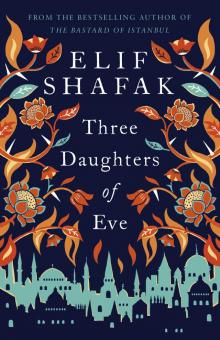 Three Daughters of Eve
Three Daughters of Eve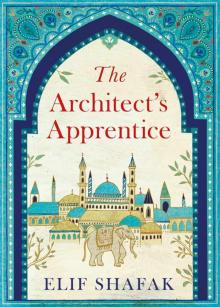 The Architect's Apprentice
The Architect's Apprentice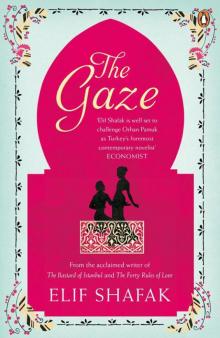 The Gaze
The Gaze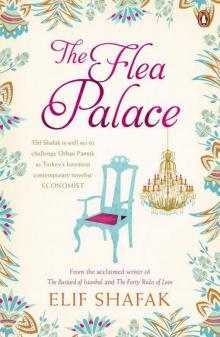 The Flea Palace
The Flea Palace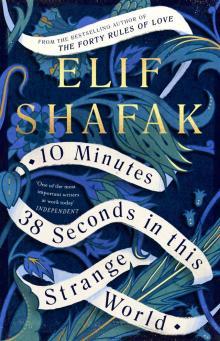 10 Minutes 38 Seconds in this Strange World
10 Minutes 38 Seconds in this Strange World The Forty Rules of Love
The Forty Rules of Love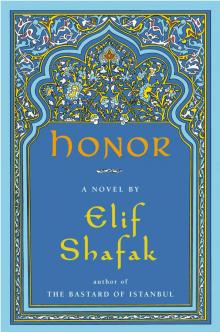 Honor
Honor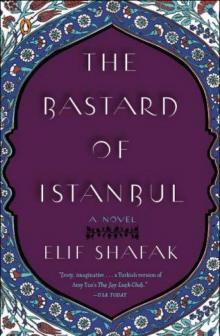 The Bastard of Istanbul
The Bastard of Istanbul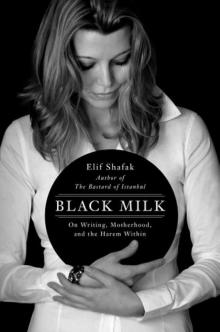 Black Milk
Black Milk The Happiness of Blond People (Penguin Specials)
The Happiness of Blond People (Penguin Specials)